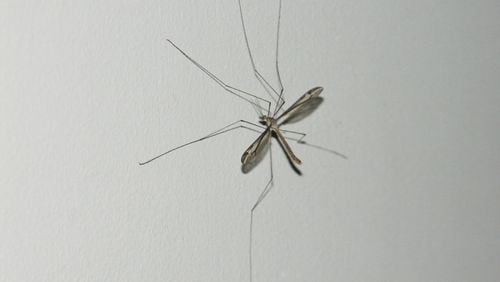Q: I have a strange insect hovering over my Bermuda grass. They look like huge mosquitoes. Some are joined by their rear ends but some are not. Do we need to do anything? David Robson, Dallas
A: You don’t need to do anything. The mosquito look-alikes are crane flies. Their only purpose in life is to do what you see them doing: mating. After the female lays her eggs into your moist lawn soil, they hatch and feed on the roots of your grass. The lawn damage is minimal. These creatures look like they could bite but their motto is “Make love not war.”
Q: Should I plant scilla in my garden? I have read about it being invasive. Marianne Blaylock, Marietta
A: Scilla, sometimes called squill, grows in several environments, in some more readily than others. In a favorable spot, scilla can grow enthusiastically. There are few places like that in Georgia, but this “enthusiasm” leads to their undeserved invasive reputation. I have scilla in my garden; I wouldn’t worry about it being invasive in yours.
Q: Do the seeds from the Bing cherries we buy at the grocery store germinate? Andy Wilkerson, LaGrange
A: The cherry seed will germinate but I’m not so sure you’ll ever get edible fruit. In the first place, Bing cherries are difficult to grow here. They perish from winter cold when trees are young or the tree blooms early and the blooms freeze, or insects and animals enjoy the fruit before you can get your share. Summer heat and high humidity promote diseases. All in all, growing sweet cherries like Bing will break your heart faster than a teenage fling, for 15 cents worth of fruit.
Q: Responding to your column about rocks in pots, I have found that moisture meters are another great way to check soil moisture levels. Bruce Wennerholm, email
A: I’m not sure I trust water meters in all situations. They can be fooled by high fertilizer salts in the soil, particularly soil that has manure in some proportion. You have to be careful with the probes. If you drop the instrument on concrete, the probes can be permanently damaged. But in the right person’s hands, one can be useful.
Email Walter at georgiagardener@yahoo.com. Listen to his occasional garden comments on “Green and Growing with Ashley Frasca” Saturday mornings on 95.5 WSB. Visit his website, www.walterreeves.com, or join his Facebook page at bit.ly/georgiagardener for his latest tips.
About the Author






